Graduate Program Universitas Prasetiya Mulya in cooperation with the William & Mary – Mason School of Business, U.S., held the Immersion Program. This activity took place from May 20th to June 2nd, 2016 at University Prasetiya Mulya BSD campus, and Bali. Participants from William & Mary – Mason School of Business were accompanied by Prof. Don R. Rahtz
Yesterday, our team had an interview with Prof. Don R. Rahtz from William & Mary College in Williamsburg, Virginia, US.
Prof. Don R. Rahtz is a marketing /marketing communications researcher (Ph.D., Virginia Tech 1984) and a Professor of Marketing at The College of William and Mary in Virginia. His expertise is in integrated marketing communication programs, marketing research, survey methodology, analysis, and market assessment. He has had a particular interest in environmental issues, economic sustainable development, transitional economies, business/community interface evaluation, and health systems.
Welcome to Prasetiya Mulya University. Is it your first time here in Prasetiya Mulya?
I’ve been a number of times to Prasetiya Mulya. Initially i’ve been writing a chapter on Indonesia for a book in 2006 with Prof. Ignas Sidik. It is the handbook of eastern South East Asia and it’s actually working on a new chapter revision because it is now 10 years since the first publication of that chapter.
So now you’re here for the immersion program. Could you tell me about it? How was the process from the beginning until now?
The immersion idea was one that we had put together on the graduate level and it run for 3 years. The students who had been involved in it really enjoyed the experience to be in here and in Jakarta working with graduate students. So, we started talking about applying it to the undergraduate as well as summer program. Previously, the graduate program just stay a 10 day program, working on a project for a corporation. This time we look at it in the summer and it would be longer and more intense kind of connection as well as putting more on the front-end piece that was co-teams. The teams that they’re working together during the immersion time here have actually been working together for the last several weeks about the past 8 weeks. They have been introduced to each other, began work on the project, and did it long distance so we would skype back and forth in a couple of occassions. The classes met at opposite end to the world, the class here meet at 7 in the morning and my class back at Williamsburg meeting at 7 pm at night so i did a couple of lectures to the students in both classes at the same time. It was a kind of a unique thing and allowed students to get to know and to work with each other and regarding the project they would be working on, which was sustainable tourism and identifying ways to create new campaigns marketing plans and business plans for the ministry of tourism and the governor of Jakarta. Right now they’re working on the project in the group of 5 member teams. 5 teams, 5 people in each team. They’ve been working together and spending several hours a day working in their group team operations while we also have common lecture for everyone.
The idea was really quite allow the undergraduate students and the institutions to be able to operate in a manner which most corporate operations these days in the global environment operate. They are really having an experience that global corporation entities have and that is that you operate cross a great distance, and you have cross cultural teams from differet societies in different part of the world all working on a single project or a deliverable that will help the company perform with its product. The students are going through the process of being in the global company and being part of the team and working out of a lot of the same issues that they may well encounter as they move forward in their career. The immersion experience that we worked out this time is really built around that: let’s create this reality of a global company and a global business environment.
Who are the participants?
The participants are students from Prasetiya Mulya University and William and Mary College. Some of them are business majors, some of them are going to be business majors, some of them are from a couple of the other majors, political science, and they are students who are interested in the global enviroment and a lot of the issues that is going on.
How was the selection process?
It was a multi-level type of application that was involved. They applied, they wrote essays, and they were interviewed.
Could you tell me more about the project? What do they have to make?
The project is built in the sustainable tourism sector. As noted, Indonesia is going through some significant changes in terms of industries and contributions. Up until now, indonesia’s economy has pretty much been based around the extraction industries, oil and gas, minerals, etc. Palm oil and things like that, they’ve been a very big contributor. However, as the shifts from those types of energy source — coals — another one — start to be depleated, there is real need to look for new sectors of the economy to contribute in a sustainable manner and tourism is one of those particular sectors that can offer a great deal of benefit for the resources that indonesia has. As it has 17.000 islands and it has a lot of diversity in culture, diversity in peoples, and unity in diversity. The idea is that tourism is one of the future’s sectors that will be absolutely critical for Indonesia. Our project is centered on coming up with business plan they relate to the tourism sector. Those tourism business plans will be presented to the ministry of tourism in Bali.
Some of them is looking at tourism on possibly one of the islands. We want to give them a little bit of broad swap that they can look at the components that relate to that or what are the things that we can contribute the most to the Indonesian Ministry of Tourism. So we thought we’d let the students work out what they thought might be the most interesting and most contributing sectors. Some of them are looking at things that are similar but just in different places, some of them are also looking at markets to develop, some of them are looking at different approaches to target markets and matching up technologies to tourism too. It’s a wide variety approaches that allows creativity involved.
What is the outcome that you expect?
They will deliver a full marketing plan and busines plan to the ministry of tourism. The expectations for the students is to provide a professional level that is a consultation level report of that will be used.
What do you think about the students’ capabilities in working with people with different backgrounds?
From what I’ve seen so far, i think the teams are working well together. We pushed them hard at times, they work all long hours, but we’ll see it come together when we did the cooking excercise. They were doing quite well and at the end it was starting to rain, they were under pressure because they were only given a certain amount of time. At the end of 2 hours of cooking, it all came together very well and we had judges from the faculty and staff who tasted the food. It really showed how the team could work together and produced a really good product at the end. They’re having fun and it seemed they really enjoyed each other.
Last question. What is your suggestion for Prasetiya Mulya for the next immersion program? What could be better?
They are doing really well, but i think one of the things is continuing to trying to move toward a more immersive experience and more of the front end piece that is more interactive, so that the class not only work on a project together but also have a completely integrated class that we are going to be able to have skyping back and forth, faculty members who team teacher class and so PMBS FM who lecture my students and I lecture the students here like I did this time. We have students who are much more immersed early and have the number of assignments that along the way so that the time on the ground — which we have a great deal spending the time on the ground — working on a particular project can be even better experience. The world is evolving so fast. It will continue, its not gonna stop. It’s only going to accellerate and so the more that we can teach our students to understand about we’re not international companies anymore. We are not international focus. We are global companies. People who are trying to do business have to recognize that global systems — macromarketing — is the interface of the systems in society. Market system in society that the well being of the communities, the well being of the countries, is really built around the interface of business and the community and it’s all the systems in the market we all operate in. Whether it is in traditional market, whether or not it is in shipbuilding, high tech, low tech; innovation in it’s back of problem solving. One of the future holds that we have to trying to figure that out. It’s not going to be what it is now, it’s gonna be something else. We have to train students to adapt. (interview by: Adalea Tarindra Yuza)
 Prof Rahtz with Immersion Program 2016 participants.
Prof Rahtz with Immersion Program 2016 participants.
_______________________________________________________________________
Salah satu tim kami mewawancarai Profesor Don R.Rahtz, dari William & Mary College (W&M) di Williamsburg, Virginia, Amerika Serikat.
Selamat datang di Universitas Prasetiya Mulya. Apakah ini pertama kalinya Anda datang ke sini?
Saya sudah beberapa kali datang ke Prasetiya Mulya. Awalnya saya sedang menulis sebuah bab tentang Indonesia untuk sebuah buku di tahun 2006 dengan Prof. Ignas Sidik. Buku tersebut adalah buku panduan mengenai Asia Tenggara Timur dan kami sedang mengerjakan revisi bab baru karena sekarang sudah 10 tahun sejak bab tersebut diterbitkan.
Jadi sekarang Anda di sini untuk Immersion Program. Dapatkah Anda menceritakan program tersebut? Bagaimanakah prosesnya dari awal hingga sekarang?
Ide program ini telah kami aplikasikan pada tingkat Strata II dan berlangsung selama tiga tahun. Para mahasiswa yang terlibat di dalamnya sangat menikmati pengalaman berada di dalam program tersebut dan di Jakarta untuk bekerja sama dengan para mahasiswa yang lainnya. Jadi, kami mulai membicarakan untuk mengaplikasikannya pada mahasiswa Strata I sebagai program musim panas. Sebelumnya, program Strata II hanya berlangsung selama 10 hari, dimana para peserta mengerjakan sebuah proyek untuk perusahaan. Kali ini akan program tersebut akan menjadi lebih panjang dan memiliki hubungan yang lebih kuat serta menitik beratkan pada front-end (interaksi antar-muka secara langsung dengan pengguna) yang dilakukan antar kelompok. Kelompok-kelompok yang terbagi dalam program ini sebenarnya sudah saling bekerja sama untuk delapan minggu sebelumnya. Mereka telah diperkenalkan satu sama lain, memulai proyek dan bekerja jarak jauh melalui skype dalam beberapa waktu. Kami juga saling bertemu antar kelas. Misalnya, kelas di sini dimulai pukul 7 pagi, sedangkan kelas saya di Williamsburg (lokasi dimana kampus W&M berada) dimulai pukul 7 malam. Jadi bisa dibilang, saya mengajar kedua kelas pada waktu bersamaan. Hal tersebut merupakan hal yang unik dan memperbolehkan mahasiswa untuk mengenal dan bekerja sama satu sama lain mengenai proyek yang mereka kerjakan mengenai pariwisata berkelanjutan dan mengidentifikasi cara-cara untuk menciptakan kampanye pemasaran baru serta perencanaan bisnis untuk Kementrian Pariwisata dan Pemerintah Jakarta. Saat ini mereka sedang mengerjakan proyek dengan kelompok yang beranggotakan 5 orang. Terdapat 5 kelompok, dan masing-masing menghabiskan beberapa jam dalam sehari untuk bekerja dalam kelompok, sedangkan kami juga memberikan kuliah umum untuk semuanya.
Ide program ini membiarkan para mahasiswa dan institusi untuk beroperasi seperti layaknya perusahaan-perusahaan beroperasi di lingkungan perusahaan global saat ini. Mereka benar-benar mendapatkan pengalaman yang dimiliki oleh perusahaan-perusahaan global tersebut dimana kita beroperasi antar jarak, memiliki kelompok-kelompok antar budaya dari lingkungan dan negara yang berbeda-beda untuk bekerja pada satu proyek yang akan membantu perusahaan untuk menjalankan produknya. Hal tersebut adalah hal yang mereka akan hadapi selagi mereka menanjak dalam karir mereka. Pengalaman immersion yang kami jalankan kali ini benar-benar dibangun atas hal tersebut: menciptakan realita perusahaan dan lingkungan bisnis global.
Siapa saja pesertanya?
Para peserta merupakan mahasiswa Universitas Prasetiya Mulya dan Perguruan Tinggi W&M. Beberapa dari mereka berasal dari jurusan bisnis dan beberapa jurusan lain seperti ilmu politik. Mereka semua adalah mahasiswa yang tertarik pada lingkungan global.
Bagaimana proses seleksinya?
Proses seleksi melibatkan beberapa cara. Para peserta pertama-tama mendaftar, menulis esai dan diwawancara.
Dapatkah Anda bercerita mengenai proyeknya? Apa saja yang harus dibuat oleh para peserta?
Proyek yang dikerjakan mahasiswa berkisar pada sektor pariwisata berkelanjutan. Seperti yang kita tahu, Indonesia saat ini sedang melewati beberapa perubahan signifikan dalam hal industri dan kontribusi. Hingga saat ini, perekonomian Indonesia kurang lebih berdasarkan pada industri tambang, seperti: minyak dan gas, mineral, dan lain-lain. Minyak sawit dan sebagainya, mereka telah menjadi penyumbang terbesar. Bagaimanapun, selagi pertumbuhan dari sumber-sumber energi tersebut — batu bara — salah satu contoh lainnya — mulai menipis, terdapat kebutuhan yang nyata untuk mencari sektor-sektor ekonomi baru untuk berkontribusi secara berkelanjutan dan pariwisata adalah salah satu sektor yang dapat menawarkan manfaat yang banyak bagi sumber daya yang dimiliki Indonesia. Mengingat bahwa Indonesia memiliki 17.000 pulau dan memiliki banyak keragaman dalam budaya, penduduk dan persatuan dalam keragaman. Itu artinya, pariwisata adalah salah satu sektor di masa depan yang tentunya akan menjadi penting bagi Indonesia. Proyek kami berpusat pada penyediaan perencanaan bisnis yang dikaitkan dengan sektor pariwisata. Perencanaan bisnis pariwisata tersebut akan dipresentaskan di hadapan Kementrian Pariwisata di Bali.
Beberapa dari peserta berfokus pada pariwisata di salah satu pulau. Kami ingin memberikan mereka sedikit pertukaran ilmu pengetahuan sehingga mereka dapat melihat komponen-komponen yang berkaitan dengan proyeknya dan hal apa saja yang dapat kita tawarkan untuk Kementrian Pariwisata Indonesia. Jadi kami berpikir untuk membiarkan mahasiswa mengerjakan apa yang mereka kira dapat menjadi sektor yang paling menarik dan berkontribusi. Beberapa dari mereka mengerjakan hal-hal yang serupa namun di tempat-tempat yang berbeda. Ada juga yang mengerjakan pengembangan pasar, menemukan pendekatan yang berbeda dalam menargetkan pasarnya dan juga menyesuaikan teknologi dengan pariwisata. Hal ini merupakan keragaman pendekatan yang luas yang melibatkan kreativitas mahasiswa.
Apakah hasil yang Anda harapkan?
Mereka akan menyampaikan perencanaan pasar dan perencanaan bisnis yang lengkap kepada Kementrian Pariwisata. Harapan saya untuk para peserta adalah untuk menyelesaikan proyek dengan hasil setingkat profesional, yaitu berupa laporan setara konsultasi yang akan digunakan.
Bagaimana menurut Anda mengenai kemampuan para peserta dalam bekerja sama dengan orang-orang dengan latar belakang yang berbeda?
Dari apa yang saya lihat sejauh ini, saya pikir para kelompok dapat bekerja sama dengan baik. Kadang-kadang kami mendorong mereka dengan keras, namun kami melihat hasilnya pada saat mereka melakukan kompetisi memasak. Para peserta melakukannya dengan cukup baik dan pada akhirnya hujan mulai turun. Para peserta berada di bawah tekanan karena mereka hanya diberikan waktu yang terbatas. Di akhir dua jam waktu yang diberikan untuk memasak, semua terlihat sangat baik dan kami memiliki beberapa juri dari dosen dan karyawan untuk mencicipi masakannya. Hal itu benar-benar menunjukkan bagaimana para kelompok dapat bekerja sama dan menghasilkan produk yang sangat baik pada akhirnya. Mereka bersenang-senang dan terlihat sangat menikmati kebersamaannya.
Pertanyaan terakhir. Apakah Anda memiliki saran untuk Universitas Prasetiya Mulya untuk Program Immersion selanjutnya?
Prasetiya Mulya telah melakukannya dengan sangat baik, namun satu hal yaitu lanjutkan untuk mencoba menuju pengalaman yang lebih mendalam dan lebih nyata lagi dan front-end yang lebih interaktif lagi, sehingga para mahasiswa tidak hanya mengerjakan proyek bersama-sama namun juga memiliki kelas yang terintegrasi sempurna sehingga kita akan mampu berinteraksi satu sama lain. Faculty Member Prasetiya Mulya dapat mengajar mahasiswa W&M, dan saya dapat mengajar mahasiswa Prasetiya Mulya, seperti apa yang saya lakukan di sini. Kita dapat memiliki mahasiswa yang sudah lebih dulu membaur satu sama lain dan sudah mengerjakan sejumlah tugas sebelumnya, jadi waktu yang kita gunakan di sini untuk mengerjakan beberapa proyek tertentu dapat menjadi pengalaman yang lebih baik lagi.
Dunia berevolusi sangat cepat. Hal ini akan berlanjut, dan tidak akan berhenti. Evolusi hanya akan mempercepat jadi semakin kita perlu untuk mengajarkan murid-murid kita untuk paham bahwa kita bukan perusahaan internasional lagi. Kita tidak lagi fokus secara internasional; kita adalah perusahaan global. Orang-orang yang mencoba untuk berbisnis harus menyadari bahwa sistem global — makromarketing — adalah sistem antar-muka di masyarakat. Sistem pasar di masyarakat dimana kesejahteraan komunitas dan negara benar-benar dibangun di antara sistem antar-muka antara bisnis dan komunitas, dan itu semua adalah sistem pasar dimana kita semua beroperasi. Baik di pasar tradisional, perakitan kapal, teknologi, dan lain-lain. Inovasi adalah tulang belakang dari pemecahan masalah. Kita harus dapat mengetahui apa yang terdapat di masa yang akan datang; hal itu tidak akan sama dengan apa yang ada sekarang. Hal itu akan menjadi suatu hal yang lain. Oleh karena itu kita harus melatih para mahasiswa agar dapat beradaptasi. (aty)
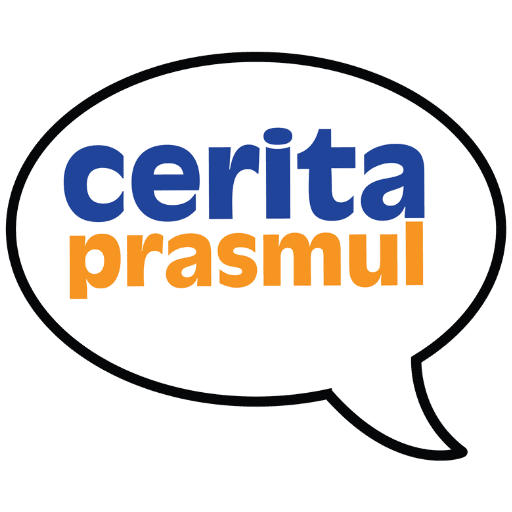
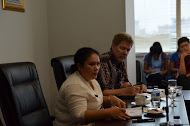


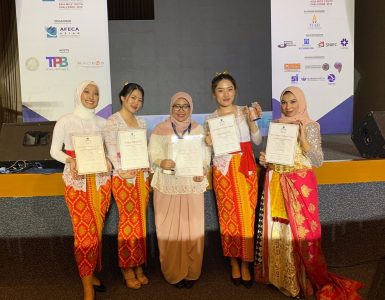
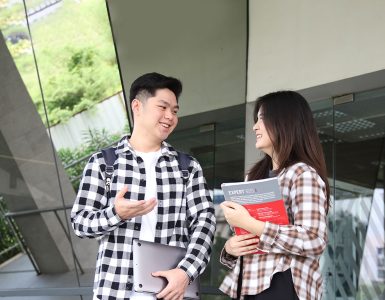
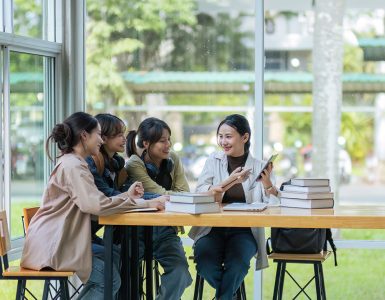
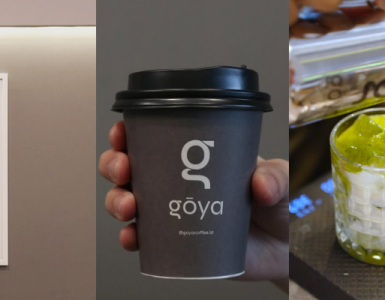

Add comment